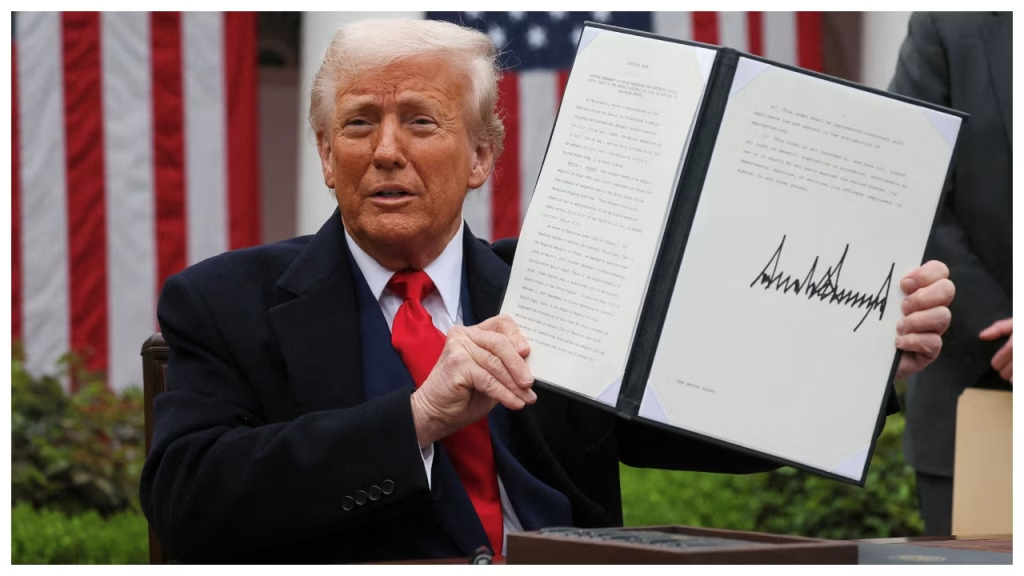In a bold and fiery escalation, California is taking the Trump administration to court over the president’s controversial and unpredictable tariff policies.
Governor Gavin Newsom and Attorney General Rob Bonta announced the lawsuit on Wednesday, accusing former President Donald Trump of overstepping his constitutional authority and jeopardizing the nation’s economic stability.
“This is the worst own-goal in the history of this country,” Newsom declared. “One of the most self-destructive things that we’ve experienced in modern American history.”

At the heart of the legal challenge is the claim that Trump unlawfully used the International Emergency Economic Powers Act (IEEPA) to impose tariffs on imported goods — with some levies reaching up to 145 percent.
READ ALSO: Asian Market Stocks Climb as US-Japan Trade Optimism Eases Tariff Worries
California argues that this act does not give the president the power to unilaterally slap tariffs on foreign imports, a power they say clearly belongs to Congress.
“We’re asking the court to rein in the president… and uphold the Constitution,” said Attorney General Bonta. “The president is yet again acting as if he’s above the law — he isn’t.”
California, home to 40 million people and responsible for 14% of the nation’s GDP, has a uniquely globalized economy. Newsom’s administration warns that Trump’s tariff chaos could cost the state billions in lost revenue, particularly as international trade slows down under the weight of uncertainty.

“If California were a country, we’d be the world’s fifth-largest economy,” Newsom pointed out. “And we’re being asked to absorb the cost of a trade war that’s hurting workers, businesses, and families — including many who voted for Trump.”
READ ALSO: Dangote Refinery Slashes Petrol Price to ₦835 Per Litre
Newsom didn’t hold back in criticizing Trump’s motives and the broader implications of his economic approach. He accused the former president of ushering in “crony capitalism” and enriching billionaire allies while ordinary Americans pay the price.
“This is the personification of corruption,” Newsom said. “Smash-mouth, in-your-face, every minute of every day. How in the hell are we sitting by and allowing this to happen?”

The governor’s passion and rhetoric have fueled speculation about a potential presidential run in 2028, but for now, his focus appears firmly on pushing back against federal overreach.
Trump has long championed tariffs as a weapon to “rebalance” America’s trade relationships. His administration’s trade agenda peaked on what he dubbed “Liberation Day,” when sweeping tariffs were suddenly imposed on dozens of countries — including traditional allies like Canada and Mexico.
Though some of these duties have since been paused, the unpredictable rollout rocked global markets and wiped trillions off stock values worldwide. For US companies, particularly exporters and manufacturers, the uncertainty has been a nightmare.

“This legal challenge is not just about California,” said Bonta. “It’s about defending the rule of law and the economic wellbeing of every American.”
The Trump camp, unsurprisingly, was quick to dismiss the lawsuit. A spokesperson accused Newsom of political theater, saying he should focus on California’s internal issues like crime and homelessness instead of “trying to block President Trump’s historic efforts to finally address the national emergency of our country’s persistent goods trade deficits.”
This lawsuit marks yet another chapter in California’s long legal battle with the Trump administration. The state has filed over a dozen suits challenging Trump-era policies — from immigration to climate change to healthcare.

Now, with global trade and constitutional authority on the line, the outcome of this case could have far-reaching consequences.
California is throwing down the gauntlet in a high-stakes fight over presidential power, trade policy, and economic justice. Whether this lawsuit curbs Trump’s tariff playbook or becomes another partisan flashpoint remains to be seen. One thing is certain — this legal showdown could shape the future of American trade policy for years to come.
Discover more from Scoop Hub
Subscribe to get the latest posts sent to your email.

